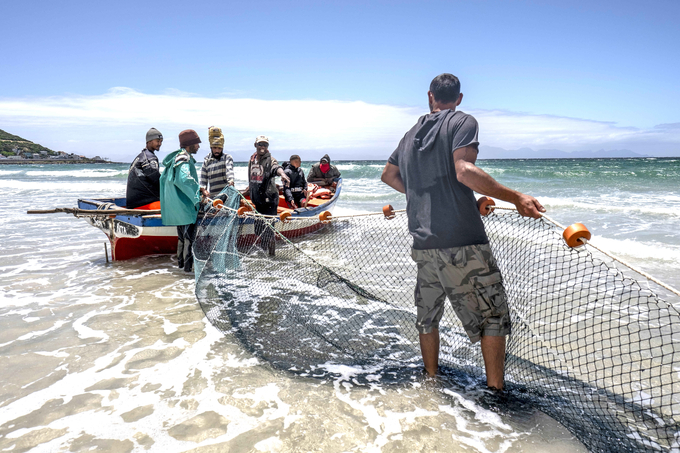November 27, 2025 | 23:55 GMT +7
November 27, 2025 | 23:55 GMT +7
Hotline: 0913.378.918
November 27, 2025 | 23:55 GMT +7
Hotline: 0913.378.918

Despite aquaculture’s growing role in the sector, marine capture fisheries remain vital for food, livelihoods and sustainable development.
The Food and Agriculture Organization of the United Nations (FAO) today underlined the need for more investment in a Blue Transformation enabling aquatic foods to play a greater role in ending global hunger and poverty. The call came as FAO Chief Economist Máximo Torero presented the findings of a key FAO report on fisheries and aquaculture to agriculture ministers from the G7 countries here today.
The flagship State of World Fisheries and Aquaculture (SOFIA) 2024 report, released in June this year, found that world fisheries and aquaculture production has hit a new high, with aquaculture production of aquatic animals surpassing capture fisheries for the first time.
But among the issues Torero highlighted was that just to ensure that the consumption of aquatic animal foods in 2050 is maintained at current levels, given that the world’s population is projected to increase to 9.7 billion by then, the the global supply would require a 22 percent rise.
Also, consumption rates and future population growth differs between regions. In Africa, for example, a 74 percent increase in aquatic food supply would be needed to keep up with current per capita consumption rates. Bringing Africa consumption rates to today’s global average of 20.7 kg per person in 2050, would require a 285 percent growth in aquatic animal provision.
Investments and transformation
“These figures are a serious reflection of the ongoing challenge to feed the world, requiring major investments and transformation in the sector,” Torero said. “This is at the core of FAO’s call to invest in a Blue Transformation, for a world where aquatic foods play a more significant and impactful role in ending hunger and poverty.”
The SOFIA report found that the contribution of aquatic foods to global food security and nutrition continues to increase, with aquaculture holding the potential to meet growing demand for aquatic foods globally.
Yet the FAO Chief Economist emphasised that despite aquaculture’s growing role in the sector, marine capture fisheries remain vital for food, livelihoods and sustainable development.
At the same time, their sustainability is an ongoing concern. In 2021, 62.3 percent of exploited marine stocks were estimated to be fished within biologically sustainable levels. This is a 2.3 percent deterioration from the assessment two years ago.
This finding highlights the need for all fish stocks to be placed under effective management. This is a key objective of FAO’s Blue Transformation vision and Torero highlighted its importance as a “tool to reverse sustainability failures.”
Crucial for livelihoods
Aquatic production is not only crucial for food security and nutrition, but also for livelihood provision, trade and sustainable development, the Chief Economist underlined.
The sector employs directly 62 million people, over 90 percent of these in small-scale fisheries operations. This highlights the necessity to consider their specific needs and ensure their full involvement in the design and implementation of policies and management measures.
Including those involved in the full value chain of aquatic production, and their dependents, it is estimated that about 600 million people depend on the sector for their livelihoods, the large majority in the developing world.
While only 24 percent of those employed in the primary sector are women, this increases to 62 percent of post-harvest workers. Gender Transformative Approaches not only change how fisheries and aquaculture are understood, but also how we shape our institutions, policies and actions, to achieve equality and equity, the FAO Chief Economist said.
Amid the projected increase in demand for aquatic foods driven by economic development and population increase, there is a need to ensure that further growth is sustainable, equitable, and targets food security and nutrition needs where they are most pressing.
SOFIA is an FAO flagship report that analyses the status and health of global fishery stocks as well as trends in fisheries and aquaculture at a global and regional level. The 2024 edition spotlights the concrete advances of Blue Transformation in action, showcasing the role of FAO, in collaboration with Members and partners, in driving change towards sustainable aquaculture expansion and intensification, effectively manage fisheries, and upgrade aquatic foods’ value chains, to prioritize efficiency, safety and equity.
(FAO)

(VAN) A new study reveals how the simultaneous effects of ocean acidification, salinity and loss of oxygen are making the world more fragile.

(VAN) Hopes are growing that the creation of the first 3D turkey gut model could be a turning point in the battle against the virulent blackhead disease.

(VAN) Tyson, America’s biggest meat supplier, plans to shutter one of its largest beef processing plants as the industry continues to struggle with low cattle supplies and political pressure from Washington.

(VAN) New FAO study shows how digital solutions are empowering farmers and fishers to prevent losses and build resilient agrifood systems.

(VAN) Brazil's COP30 presidency pushed through a compromise climate deal on Saturday that would boost finance for poor nations coping with global warming but that omitted any mention of the fossil fuels driving it.

(VAN) Poultry farmers in the UK have been warned that they could face one of the worst winters yet for bird flu.

(VAN) Prices of main-crop paddy have risen sharply, with jasmine rice hitting 16,100 baht per tonne — the highest level in years.